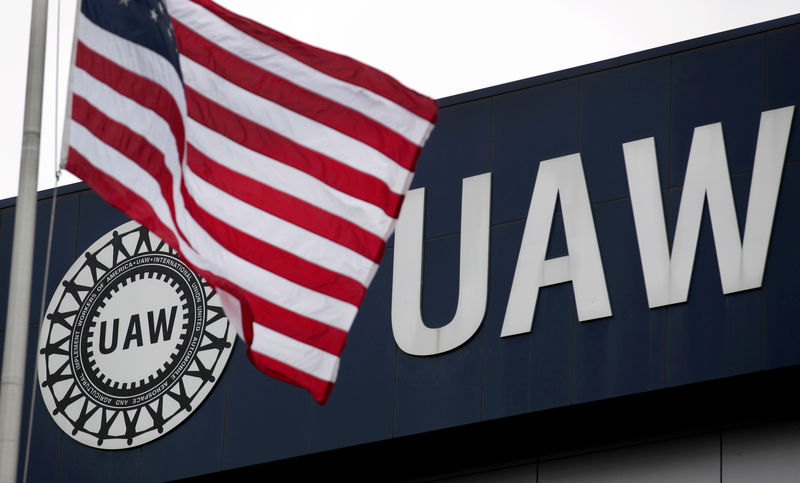By Nick Carey
CHATTANOOGA, Tenn. (Reuters) - For the second time in five years, workers at Volkswagen (DE:VOWG_p) AG's Chattanooga, Tennessee, assembly plant have been voting this week on whether to unionize, potentially handing the United Auto Workers its first toehold in the U.S. South.
The vote by 1,700 workers at VW's Chattanooga plant, which makes the Passat sedan and the Atlas SUV, comes at a pivotal time for the UAW. Its membership fell 8% last year and the union faces contentious contract talks this summer with Detroit automakers General Motors Co (NYSE:GM), Ford Motor (NYSE:F) Co and Fiat Chrysler Automobiles NV.
The result in Tennessee could mark a small but significant step toward the UAW's cherished goal of unionizing foreign automakers. In 2014, VW's Chattanooga workers voted against unionization by a small margin, extending the UAW's decades-long losing streak in the South.
The latest organizing vote has been opposed by prominent Republican elected officials in Tennessee and is expected to be close. Voting began on Wednesday and polls close late Friday.
Pro-union VW workers complain of lax health and safety procedures, of quality of life issues such as constant last-minute changes in scheduling, insufficient vacation time and small bonuses.
"This is not about a pay raise," said Steven Fugat, 26. "I just want some stability, I want to know when I have to work and when I get to be with my family or helping out at my church."
Fugat makes $20 an hour hanging tires, installing consoles, seats and rearview mirrors on Atlas and Passat vehicles near the end of the assembly line.
"I want respect for my time and we are ready for a change for the good," he said.
UAW faces membership challenge: https://tmsnrt.rs/2I4S0wa
Detroit automakers pay more for unionized workers: https://tmsnrt.rs/2WE3UEM
Pro-union workers allege VW has argued against unionization in daily meetings, but a company spokeswoman said it respected "the right of our employees to decide."
In January, the German automaker said it would invest $800 million to build a new electric vehicle in Chattanooga starting in 2022, creating 1,000 new jobs.
When asked if a vote for unionization could affect that plan VW's spokeswoman said the automaker's commitment "is unchanged."
VW also has workers on the factory floor who oppose the UAW.
Keri Menendez, 44, said her problem was not with organized labor but with the UAW, which has struggled with a wide-ranging federal corruption probe.
So far seven people linked to the union and Fiat Chrysler have been sentenced in the investigation into illegal payouts to UAW officials. The UAW and the automaker insist only a few individuals were involved.
"Corruption has been a problem for the UAW," said Menendez, a team leader on the line making $23.50 an hour. "They're more interested in their own business than caring for people."
Republican U.S. Senator Marsha Blackburn of Tennessee said in a statement it was "deeply concerning that an organization with such a troubled past could soon force their grip onto workers in Chattanooga."
FALLING MEMBERSHIP
At its peak in 1979, the UAW represented 1.5 million workers. Last year, after nine years of gains, membership dropped again to below 400,000.
The union's gains in recent years had come mostly from unionizing casino workers, graduate students and nurses instead of automotive workers.
Brandi Ginger, 43, who works in quality control at the VW plant, dislikes that history of decline.
"How can an organization that has fallen that far ever be considered successful?" she asked.
Maury Nicely, a Chattanooga attorney who oversees Southern (NYSE:SO) Momentum, an anti-UAW group, said the union would scare away other potential investors and "render us less competitive."
A victory in Chattanooga would give the UAW a psychological boost, but the major manufacturing operations of Toyota Motor Corp and Nissan Motor Co Ltd lie further south in states like Alabama and Mississippi that lack Tennessee's history of partial unionization - GM, for instance, has a plant in Spring Hill, Tennessee.
"A win at VW would give the UAW bragging rights," said Cox Automotive analyst Michelle Krebs. "But a win in the Deep South is not in the cards."
Unionizing those major operations could strengthen the UAW's hand with the Detroit automakers, which want to narrow the gap between what they pay U.S. hourly workers and their foreign counterparts.
For instance, VW notes that in 2018 the average assembly worker at Chattanooga earned nearly $55,000 last year and skilled workers made more than $78,000, above the Chattanooga area's average annual wage of almost $46,000. But that is well shy of the $95,000 and $123,000 the average U.S.-based GM assembly worker and skilled work made respectively, including overtime and profit-sharing bonuses.
Steven Bernstein, a Tampa-based labor attorney at Fisher Phillips LLP, said that if the UAW wins in Chattanooga, it must prove its worth to win elsewhere.
"The UAW would have to deliver meaningful, tangible benefits to VW workers, otherwise why vote for them?" Bernstein said.
But first, the UAW must win.
Shannon Fossett, a team leader at the Chattanooga plant, campaigned for unionization in 2014 and said he believed the UAW could win, but was nervous about how close the vote could be.

"It's got to happen, we've been pushing for a union for years," he said. "After all that work, how can it not happen?"